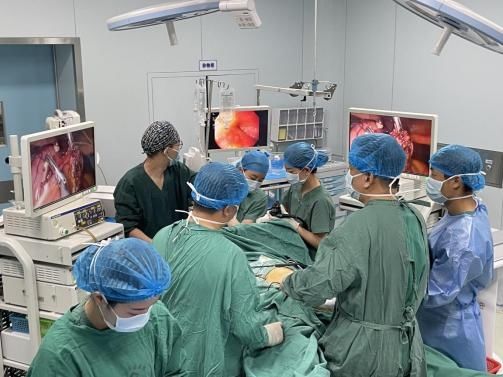Repeated upper abdominal pain, unable to eat, losing weight… These symptoms are too much for a young man, let alone an 80-year-old. Recently, the General Surgery Department of Shenzhen Hengsheng Hospital welcomed such a patient: 80-year-old Grandma Guo (pseudonym), who had been bleeding from the upper gastrointestinal tract (duodenum) for 7 years.
Begins with trust
Grandma Guo has underlying diseases such as senile dementia, hypertension, diabetes, etc., and the chronic bleeding time is up to 7 years. Seeing that the old man was getting rid of black stools every day, he was losing weight, his immunity was declining, and his physique was deteriorating. In the end, the patient’s family came to Shenzhen Heng Seng Hospital on the recommendation of a friend, and with the mentality of not letting go of any hope, they found Cheng Ming, director of Hang Seng General Surgery.
After learning about Grandma Guo’s condition, Director Cheng communicated with her family for many times to discuss her condition, operation methods and complications. Director Cheng’s patient and professional explanations won the trust of the patient’s family, which gave Director Cheng Ming and his medical team great encouragement.
Professionalism
“The trust of patients and family members in us, as well as the filial piety to Grandma Guo moved us, so we decided to face the difficulties and implement them for the elderly as soon as possible. Surgical treatment can help the elderly recover.” Director Cheng Ming said.
In order to achieve the radical effect, the hospital organized a multidisciplinary consultation in the general surgery department, gastroenterology department, cardiology department, ICU, anesthesiology department, operating room, and nursing department to formulate detailed preoperative, intraoperative, postoperative The treatment and risk management plan strives to minimize the risk of surgery, so that the elderly can smoothly pass through difficulties such as anesthesia, surgery, and postoperative rehabilitation. After thorough discussion and evaluation, the expert team decided to implement “laparoscopic duodenoplasty + gastric short-circuit + intraoperative gastroscopy” for Grandma Guo from the General Surgery Department, and then the Cardiology Department to perform “gastroduodenal vascular intervention”. Embolization”.

(the picture shows Director Cheng performing the operation for the patient)
“Intraoperative gastroscope in gastroenterology department Under the guidance of the patient, three bleeding points in the duodenum were found, two of which were mainly located in the duodenal bulb, and the operation space was very limited. Only duodenotomy and suture + plasty could be performed. Duodenal stenosis and intestinal fistula, plus gastro-jejunal bypass operation. Another potential bleeding point is located in the ampulla of the duodenum, which is a key part and cannot be easily sutured or removed. ‘Relay’, wait for the patient’s condition to stabilize before performing gastroduodenal vascular interventional embolization.” Director Cheng Ming introduced.
The operation was very complicated, but due to the perfect planning in the early stage and the precise and meticulous operation, the general surgery team successfully completed the operation in more than 4 hours. Looking at the stable vital signs of Grandma Guo, everyone relaxed a little. tone.
Rehabilitation and discharge
Although the risk of one-stage surgery has been overcome, interventional surgery will be required later, so the management of patients and the prevention of complications should not be taken lightly. Starting from the first day after the operation, Director Cheng Ming conducted ward rounds in person every day, and paid careful attention to the patient’s vital signs, incision conditions, the amount and nature of the drainage fluid, etc. Head nurse Ye Xihong led the nursing team to take care of the old lady in all aspects. , carry out high-quality nursing work from various aspects such as diet and daily life, turning over and patting the back, dressing to keep warm, and psychological communication.
With the gradual recovery of Grandma Guo, the second-stage interventional operation was also scheduled. Director Guo Yujun of the Cardiology Department successfully completed the gastroduodenal artery embolization under local anesthesia. The bleeding point was completely blocked, and the old man quickly transitioned to total enteral nutrition. Various examinations showed that the old man recovered well and had no more bleeding symptoms. After a recovery period of nearly a month, he was discharged from the hospital smoothly.